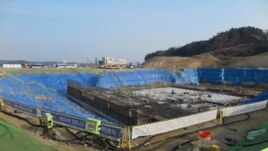23 August, 2016
In Olympic sports, attention is now turning to the 2018 Winter Games in Pyeongchang, South Korea.
South Korean organizers say they hope to avoid the delays and other problems organizers faced in Rio de Janiero. In 1988, South Korea hosted the Summer Olympic Games in Seoul.
A slowing economy and budget shortfalls caused delays in some projects in Rio. Others were left unfinished. Organizers in the Brazilian city were criticized for the delays. They prevented complete testing of some Olympic buildings and structures before the games started.
Australian officials complained of bad housing conditions after its athletes arrived. They said the housing was "not habitable." The Australian team stayed in a hotel while the problems were fixed.
Some Chinese athletes in Rio posted pictures on social media of broken bathroom facilities.
Organizers of the Pyeongchang Olympics say they learned some important lessons from the problems in Rio. They have promised to complete all Olympic buildings and infrastructure improvements in time to fix unexpected issues.
Yeo Hyung-koo is Secretary General of the Pyeongchang Organizing Committee. "We are making an effort to ensure the Pyeongchang Olympics will be progressive and successful by having learned from Rio as a reference," he said.
The committee estimates the Pyeongchang Olympics will cost $12 billion. This is much higher than the $4-$6 billion spent in Rio. But it is far less than the $50 billion spent on the 2014 Sochi Winter Games in Russia.
Earlier this month, the president of the Pyeongchang committee, Lee Hee-beom, said all preparations were "fully on track" for the games. "We will work hard for success at the Games in 2018." Lee made the comments during a meeting of the International Olympic Committee in Rio.

A general view of the construction site of Gangneung Ice Arena which will be a venue for the figure skating and short track competitions during the 2018 Winter Olympic Games, in the coastal cluster of PyeongChang, February 11, 2015.
South Korean officials have said all 12 Olympic venues are expected to be completed by September 2017. Organizers plan to hold test events before the games to identify and correct any problems.
One of the most expensive projects will be building a high-speed railway linking the Pyeongchang mountain area to Seoul. The train is expected to be finished by June 2017. It will reduce the travel time of the 120-kilometer trip from four hours to one.
South Korea's central government is paying for infrastructure improvements, as well as 75 percent of the costs for sports facilities. The local government in Gangwon province will pay the remaining 25 percent.
Organizers have also said that 90 percent of South Korea's Olympic sponsorship goal of $760 million will be met by the end of this year.
Some local residents have complained that the games will result in higher taxes and increased housing prices.
Officials, however, have pointed out that the area will benefit from the new sports venues for many years to come. They say plans have already been made to use 10 of the 12 Olympic buildings after the games. The facilities will be used for professional and amateur sports, education, cultural events and exhibitions, officials said.
I'm Bryan Lynn.
Brian Padden reported this story for VOA News. Bryan Lynn adapted it for Learning English, with additional information coming from the Associated Press and Reuters. Mario Ritter was the editor.
We want to hear from you. Write to us in the Comments section, and visit 51VOA.COM.
________________________________________________________________
Words in This Story
habitable – adj. in good enough condition to live in
bathroom – n. a room with a bath or shower, sink and a toilet
infrastructure – n. basic systems used to serve society, such as transportation and communication
progressive – adj. happening or developing steadily
venue – n. a place to hold sports, music or other special events
sponsorship – n. an agreement between organizations to jointly provide money to support something
benefit – v. to be useful or helpful
amateur –adj.